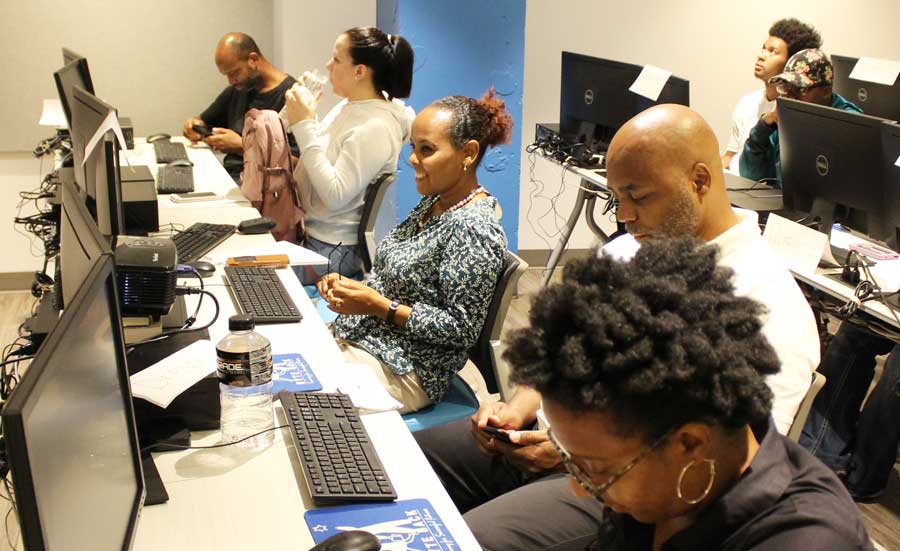While more District residents have acquired internet access in recent years, a digital divide still exists between those who enjoy the benefits of technology and those who cannot. Two bills currently moving through the D.C. Council aim to close these disparities and boost public knowledge about the use of computers, smartphones and other devices.
“The digital economy is where most of our growth in our economy is projected to take place over the coming decades,” said Councilmember Brandon Todd during a public hearing for the legislation in July.
The Digital Literacy Council Establishment Act of 2017 would create a team of government officials, business leaders and technology experts that would search for ways to improve digital literacy in schools and workforce training programs. Todd said that technology-related knowledge and skills are becoming more important for residents to gain employment.
The Wi-Fi Task Force Act of 2017 would establish a similar group of government officials and local stakeholders to discuss the possibilities for creating free wireless internet throughout the city.
“Free public Wi-Fi is a matter of economic equality and would help to erase the digital divide that prevents so many of the District’s less fortunate residents from bettering their lives,” Todd said.

During the hearing, Kymone Freeman, a local activist and co-owner of We Act Radio, testified that the bills are necessary to close employment and poverty gaps between neighborhoods east of the Anacostia River and those west of it. Freeman said his internet often goes out during radio broadcasts, and technicians have told him the service problem is a result of a bottleneck of availability east of the river.
“Public policy has an obligation to address these digital divides, and addressing these digital divides may require public investment,” Freeman said.
After the council’s August recess, the Committee on Government Operations, which Todd chairs, will review both bills. If the committee approves the bills, they will be considered by the full council.
The Digital Literacy Council would have six nongovernmental representatives. Elizabeth Lindsey, the executive director of Byte Back, said her organization would be a natural addition.
“We have 20 years of experience and nobody in the District has done more for digital literacy and digital inclusion than us,” Lindsey wrote in an email. “If we’re part of a future council, we would ensure that proposed digital inclusion solutions will be the right ones for D.C. residents.”
Byte Back, which provides computer training and career preparation to District residents, moved into a new location near Union Station last week that includes four computer rooms, a video studio, virtual reality technology and a staff meeting room. The organization also teaches classes at D.C. Public Library branches, which offer computers and internet access.

Nicholas Kerelchuk, the DCPL technology and innovation manager, said at the hearing that the library system supports the bills. He asked that DCPL have a representative on both the Wi-Fi task force and the Digital Literacy Council.
“Not a day goes by — or probably even five minutes goes by — without somebody coming into our library and asking, ‘How do I get a basic email address? How do I apply for a job?’” Kerelchuk said. “These basic skills are entirely still needed, and that digital divide is probably larger than what most people think.”
Deb Socia, executive director of the nonprofit organization Next Century Cities, spoke on other cities’ efforts to bridge the digital divide. She said New York City, which replaced traditional phone booths with Wi-Fi hubs, and Boston, which brought public Wi-Fi to one of the its poorest neighborhoods, should be looked to as models.
The proposed Digital Literacy Council would be required to create two strategic plans. One would be used as part of local workforce training programs, and the other would aim to ensure all D.C. Public School students are digitally literate by graduation.
During the hearing, local teacher Giana Clarkson spoke of the need for students to view technology as more than just a source of entertainment.
“As a history teacher, using websites … offers students a time machine to walk through the beaches of Normandy during World War II, watch the inauguration of Kennedy, march through the streets of Selma and analyze the effects of the civil-rights movement, even in modern-day D.C.,” he said.
Clarkson said the council’s plan must also address the underlying needs of students, adding that technology “is not a silver bullet.”
“The implementation of a digital learning program in the District is paramount for students’ success,” he said. “It will help them compete in the global economic market, close the gap of achievement between lower and higher performing students and … teach educators and students how to use the internet and software to generate projects and papers.”
If the bills become law, the Wi-Fi task force would be required to publish its recommendations on policy initiatives and funding requirements by Dec. 31, 2018. The Digital Literacy Council would have to submit its strategic plans within 180 days of the law’s implementation.




